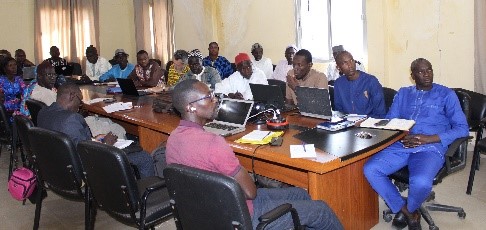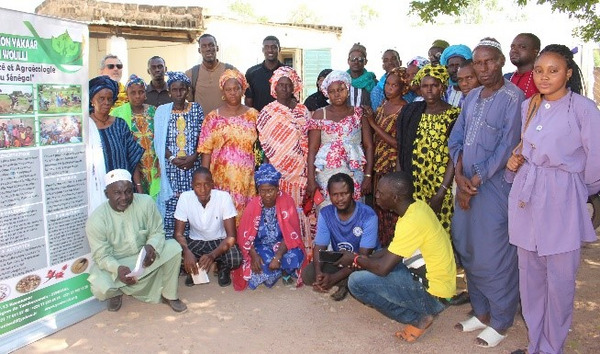As part of the SustainSahel program, Innovation Platforms (IP) were created under the coordination of WP2 to reinforce the collaboration between local actors, researchers, and authorities. The monitoring mission led by the FiBL team, responsible for project coordination, took place in Senegal, notably in Niakhar, Ouarkhokh et Koussanar, from November 27 to December 6.
The objective was to evaluate the effectiveness of the IPs and to strengthen the WP2 system in the country. Despite notable progress, challenges remain, highlighting the importance of co-creation and the continued involvement of authorities to ensure the sustainability of these innovative initiatives. In order to ensure a more coherent invervention, WP8 took the initiative of participating in this meeting, aimed at improving the visibility of the IPs. This approach underlines the commitment to a collaborative approach and highlights the importance of close coordination between the different WPs.
An effective development program is based on innovative collaborative structures promoting synergy between local actors and researchers. IPs encourage dialogue between stakeholders in plant production, the integration of shrubs into agricultural systems and livestock feeding. Each site is supervised by an agricultural advisor and researchers working in tandem, in collaboration with the model farmers and local authorities.
This mission aims to evaluate the functioning of the IPs and to strengthen the WP2 system in Ouarkhokh, Niakhar and Koussanar. Gian Nicolay, researcher at FIBL, underlines: “We are here to support the activities on the three project sites and evaluate the functioning of the IPs and the dissemination with the model farmers to achieve the project objectives. Senegal has made a lot of progress over the past 12 months. While there were quite a few blockages, today the results are quite satisfactory.”
Malamine OUATTARA, Executive Director of RESCAR-AOC, adds: “The objective of the mission is to contribute to the animation of innovation platforms through participation in meetings of IPs in Senegal. »
The mission began in Ouarkhokh and Niakhar, the only sites with an IP. Each has developed an action plan that takes into account the specific difficulties of each area. Michael Diédhiou of the CNCR explains the importance of this strategy: “Roadmaps are tools allowing IP members to follow planned actions, in accordance with the intervention logic of the SustainSahel project. However, challenges remain, such as reforestation and monitoring of livestock vaccination.” Malamine Ouattara recalls the importance of co-creation instead of simply implementing actions on the ground: “We note good dynamism within the IPs and active participation of the members. IPs can play a crucial role in co-creating knowledge and innovations to address the challenges of integrating crops, trees/shrubs and livestock.”
Producers consider IP as an opportunity, testifying to the importance of these platforms in solving common problems. Babacar Diop, Niakhar IP coordinator, says: “This platform allows us to know each other better, to consult and discuss common problems. Local authorities are also part of the platform. It’s a good idea to bring breeders and farmers together.”
Following meetings with the Ouarkhokh and Niakhar IPs, a positive assessment was drawn up, but challenges remain, particularly with regard to the sustainability of the IPs. Malamine Ouattara stresses the importance of the continued involvement of the authorities to ensure long-term success: "I think they're on the right track. At both sites, the local authorities are very much involved in implementing the activities, and they have taken on board the approach. The IPs are also in synergy with other local frameworks and approaches. All this helps to ensure better ownership and sustainability of the IPs".
The mission ends in Koussanar, a promising site where the project is behind schedule. 15 organic model farmers have been selected. Gian Nicolay asserts: "Koussanar is a site with great potential, but which presents various challenges, such as the disappearance of trees and charcoal production, among others. It is also the site where the project doesn`t impose itself too much. Today, with the local convention, we have a way of changing things. The municipality and the district are very committed.” During the meeting in Koussanar, growers expressed their enthusiasm for taking part in the project, stressing that SustainSahel's innovative techniques match their practices. The IP is currently being set up, with a meeting scheduled for the coming days.




 tap and then scroll down to the Add to Home Screen command.
tap and then scroll down to the Add to Home Screen command.